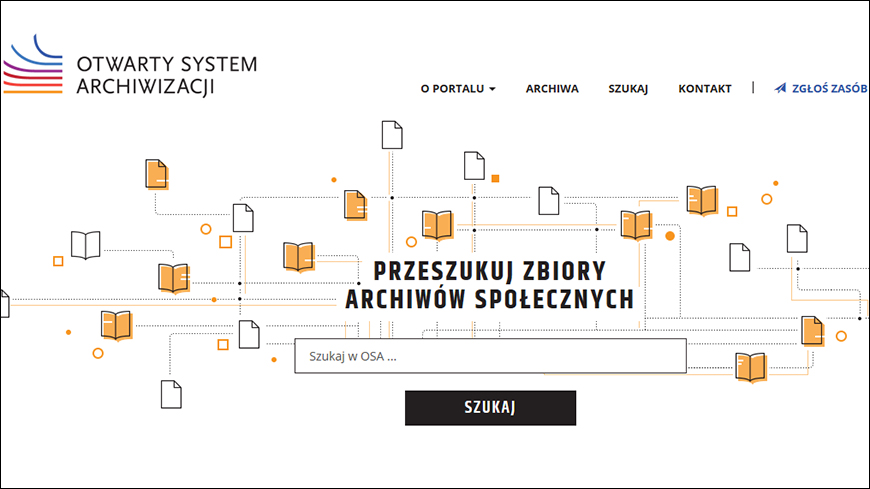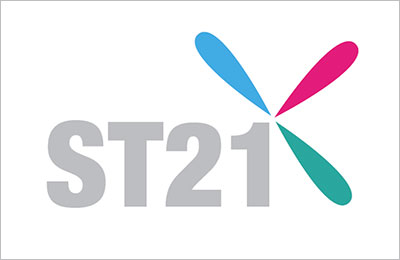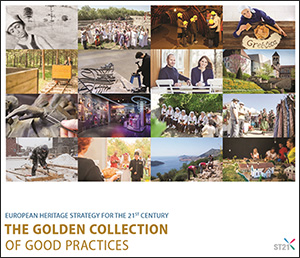Location of the initiative:

Relation to Strategy 21 Recommendations:
Time span of the initiative:
Start Date: 2017 / End Date: No end date, the project will continue and be further developed
Motivation / Methodology
Since 2002, the KARTA Centre Foundation has sought support for social archives. Such archives are entities which secure, develop and share collections related to the history of cities, towns, villages, communities, circles, artistic groups, sports clubs, national minorities – namely topics which are insufficiently represented at state memory institutions. Social archives are kept by foundations, associations, municipal libraries or informal groups– they are created by passion and interest in a historical topic. In most cases, they receive no finance and are maintained by non-professionals in collaboration with the community. Social archivists record relations with the residents and obtain photographs, documents, diaries and correspondence from such residents. Frequently, these materials are unique on a global scale (e.g. legacies of exceptional artists, activists, athletes, individuals and organisations with an impact on public life). However, their activity is not limited to archiving – these entities also organise walks with the residents, meetings, workshops and outdoor exhibitions. They restore memory to communities. They discover their own heritage for them.
Our aim is to safeguard the collections of social archives, professionalise their activity, as well as support them in implementation of the concept of social participation in their communities.
The method we adopted consisted in direct contact with social archives. On this basis, we managed to build a database of social archives – currently in Poland there are 460 of them. The next stage was professionalisation of these initiatives – through dedicated training and creation of a handbook. At each stage, it was important for us to take care of the collections and ensure lasting protection thereof, as well as to safeguard the social archive movement itself – so it can remain spontaneous, based on passion and collaboration with the community.
We work on the basis of interdisciplinarity and co-creation – apart from social archives, we also involve the scientific community, the technology industry, the creative sector and state authorities in our activities.
One of the most important elements of our activity is the Open Archiving System (www.osa.archiwa.org) – a portal which can be used to describe and search the collections of social archives. Until now, each social archive has used its own instrument for describing its collections – these were Excel files, card catalogues, an organisation’s own pages. In practice, this made it impossible to search multiple collections at once. Furthermore, each archive utilised its own, non-uniform way of description.
The aim of the OAS Portal is to consolidate information on the social collections from across Poland, which have hitherto been scattered across hundreds of separate IT systems. The OAS is fully based on standards of the International Council on Archives and was consulted with the scientific community and state archivists. At the same time, it is easy and intuitive to use so at to enable use by individuals without specialist knowledge in the field of archiving. It fulfils an educational role – each of the description fields (e.g. reference number, title, date) features hints explaining how it should be filled in, based on exampled from social archives.
The system was made available in 2018. At present, 44 organisations (20 non-governmental organisations, 12 municipal libraries, 4 cultural centres, 4 informal groups, 3 university centres, 1 village community school) develop their collections with the use of the OAS. The collections included in the OAS concern topics such as: the history of Bronowice Małe, a village near Krakow; the history of Polish Himalayan mountaineering and the life of an exceptional mountaineer, Jerzy Kukuczka; the history of village schooling; the history of the Esperanto movement; the history of folk artists in Lower Silesia; the history of Polish jazz. These are only examples demonstrating that social archiving takes care of areas which are absent from state memory institutions and that without the foundation, local associations and municipal libraries these materials would not be preserved. We are planning to have collections of hundreds of social archives included in the OAS.
Obstacles / Barriers
Our primary concern is finance for current activities. Obtaining subsidies for new projects connected with social archiving is not a problem, but if we wish to continue to serve as a spokesperson and coordinator of the area, we need to maintain the activities we have taken thus far, such as:
– the database of 460 social archives, which should be updated at least once every two years (which requires direct contact with each organisation)
– regular meetings and training of social archivists
– maintenance and development of the Open Archiving System: it is a high-technology system, it requires constant programming support and protection of the entered data, as well as introduction of new functionalities to address the users’ needs.
One major problem when it comes to creating and developing the OAS system is that the majority of social archives already have more or less described collections in their own instrument. It is impossible to transfer these data to the OAS automatically – due to the difference in methods of description. It is also impossible to create a single universal import tool. Thus, for some organisations joining the OAS means describing their collections once again.
At the beginning of our activity, we faced the problem of lack of awareness of the existence of social archiving. The lack of knowledge affected even the entities comprising the movement – the term “social archive” was not recognised even among organisations which documented history at grass-roots level. The scientific community did not conduct any research on archiving. In state documents, the term did not appear, and the area remained unnoticed. This changed slowly but – owing to systematic activity – in all the above-mentioned areas.
Change / Impact
The changes resulting from the KARTA Centre Foundation’s activities with respect to social archiving are as follows:
– provision of the technology infrastructure and knowledge platform for social archives, which resulted in creation of a stable basis for development. The infrastructure consists of: the industry portal at archiwa.org, the Open Archiving System, regular meetings and training organised by us (e.g. Social Archive Congresses)
– the ability to finance activity of social archives: owing to the efforts of the KARTA Centre Foundation in collaboration with the Head Office of State Archives, the Archiving Act was amended by way of introduction of a provision on organising competitions for subsidies for operation of social archives
– creation of an instrument for integrating information on social archive collections: The Open Archiving System (osa.archiwa.org), which contributed towards improved availability of part of the national heritage,
– enhancement of the importance of local history, the history of everyday life, fates of individuals, the history of artistic groups, national minorities and communities as an important aspect of national heritage
– promotion of the concept of social archives as a method for intergenerational or intercultural integration within local communities,
– introduction of social archiving into scientific research,
– education of non-professional groups in the scope of acquiring collections, describing archives, digitisation, legal and ethical issues connected therewith, methods of familiarising communities with their heritage
Lessons learned
Our experience in the role of a spokesperson and coordinator of the social archive network and in creation of the Open Archiving System has taught us that:
– The most effective solution when creating the network is direct contact with organisations (during meetings, training, contact via telephone and email) – this allows for building recognition and trust.
– It is a good idea to use proven solutions which have already been developed by other institutions. When we created the Open Archiving System, we based it on the international standards for archiving in terms of methodology instead of creating a completely new system of description,
– It is a good idea to build projects, and in particular IT tools, on the principle of co-creation, in consultation with various groups. In the case of the OAS, these were social archives, state archives and scientific communities. Various groups were consulted on the initial assumptions; in this way, we created a high-quality tool which meets the needs of its users. This consultation continues.
– It is important to build long-term strategies, even if an organisation works on a project basis, receiving subsidies for specific initiatives. A strategy makes it possible to achieve objectives which are impossible to accomplish as part of a single project.
– When creating the network, we apply the principle of egalitarianism. The only thing needed to join the social archive network is the will to do so. We do not check if an organisation meets all working standards for archives. After being accepted into the network, organisations frequently improve the quality of their work and learn to strive for the highest standards of protection or description of their collections, drawing inspiration from the activity of other social archives.
– The safeguarding of collections which remain in the hands of non-state organisations can be achieved through education, raising their awareness of the value of heritage, creation of conditions for their development and the free tools available, rather than legal restrictions or penalties connected with inappropriate management of collections
– Creation of a good technology or IT tool is not enough. It is also necessary to build the network, promote the concept, meet various groups of potential recipients in person.
Online resources
- www.archiwa.org – website of social archives
- www.osa.archiwa.org – website of the Open Archiving System
- www.karta.org.pl – website of the KARTA Centre Foundation
Contact information
Ziętal, Katarzyna
Fundacja Ośrodka KARTA / The KARTA Centre Foundation
[email protected]
+48 22 844 10 55
Source of financing
Public financing





